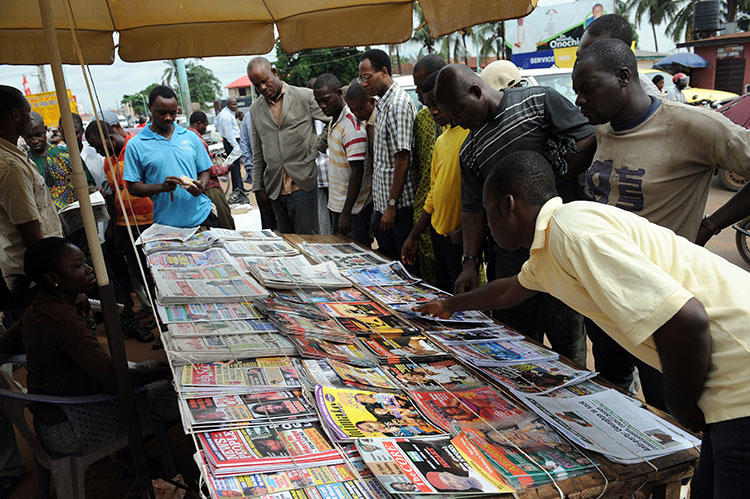New York, October 29, 2019—Authorities should drop all charges against journalists Joe Ogbodu and Prince Amour Udemude, and reform Nigeria’s penal code to ensure that journalism is not criminalized, the Committee to Protect Journalists said today.
On October 24, a magistrate court in Asaba, the capital of Nigeria’s southern Delta State, arraigned Ogbodu, an editor with the privately owned news website Big Pen Nigeria, and Udemude, a reporter with the privately owned National Mirror newspaper, on four counts of criminal defamation and one count of disturbing the peace, according to the journalists and a report by Big Pen Nigeria. Defamation and disturbing the peace are punishable by up to two and three years in prison, respectively, under Nigeria’s penal code.
The charges stem from a complaint filed by Sam Ogri, a businessman named in an October 14 Big Pen Nigeria report, according to the charge sheet seen by CPJ and Ogbodu. The paper reported that recent violence in Uzere, a community in Nigeria’s southern Delta State, was in response to oil revenue corruption in which Ogri was allegedly involved and that the businessman financed the youths behind the violence.
When contacted by CPJ over the phone, Ogri declined to comment.
“Criminal defamation is an arcane vestige of Nigeria’s colonial era. Laws that criminalize the press have no place in a modern society that aims to respect press freedom,” said CPJ Africa Program Coordinator Angela Quintal. “Nigerian authorities should drop the charges against journalists Joe Ogbodu and Prince Amour Udemude and allow them to continue their work without fear of imprisonment.”
Ogbodu told CPJ that police asked him to come in for questioning on October 23. The journalist said that he was held for six hours and that officers tried, unsuccessfully, to make him state that the report was false.
Udemude told CPJ via phone that he was arrested at his home in Okwofor, a district of Asaba, on October 22, for allegedly sharing information about the corruption and violence with Big Pen Nigeria. His outlet, National Mirror, did not report on the unrest and allegations of corruption.
The reporter said that he was taken to the Delta State Police Command office in Asaba, where he was forced to write a statement dictated by an officer. Udemude said that an investigation officer named Theresa Okpor threatened him with prolonged questioning and detention if he did not write what was dictated.
Udemude said he was held at the station for 11 hours before being released on bail without charge and asked to return the following day. During the detention he was forced to take off all his clothes, except his underwear, the journalist said.
Udemude told CPJ that when he returned on October 23, he was questioned on allegations related to a retired Nigerian army general, Alexandra Ogomudia, who was also mentioned in the Big Pen Nigeria report. He said police released him 10 hours after he arrived at 8 a.m. and asked him to return the following day, when he and Ogbodu were arraigned.
When contacted by phone, Okpor declined to comment and directed CPJ to the state police public relations officer.
The Delta State police commissioner, Adeleke Adeyinka, told CPJ that criminal defamation was within the law. Adeyinka declined to comment on the allegation that Okpor forced Udemude to write a statement.
CPJ’s calls and a message sent to Ogomudia on October 28 went unanswered.
Ogbodu and Udemude told CPJ they are scheduled to appear in court on November 12.
